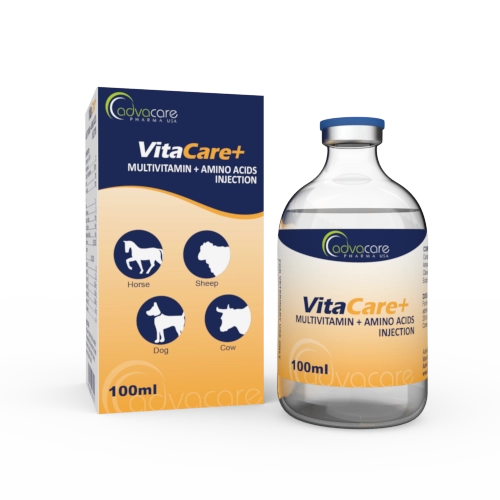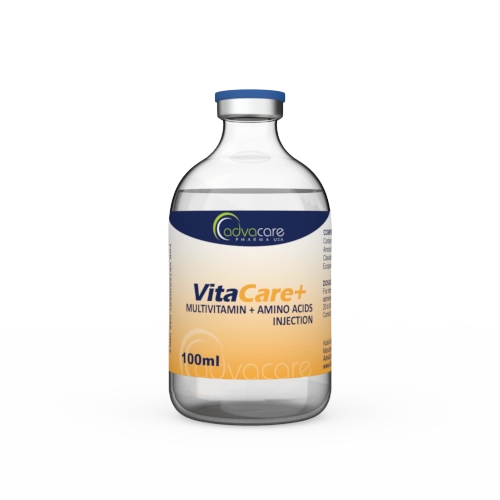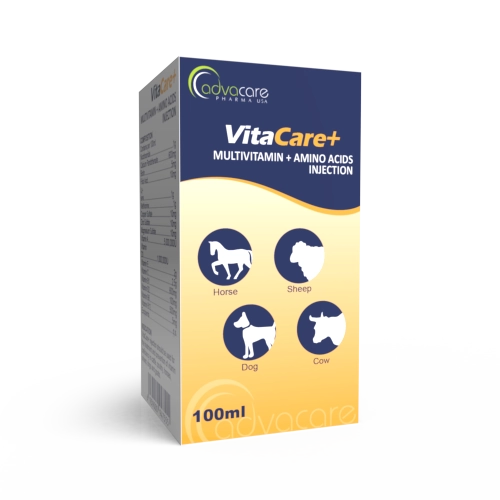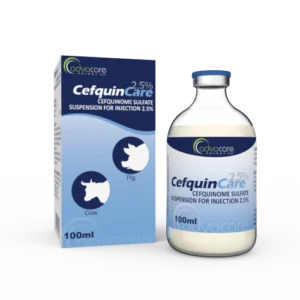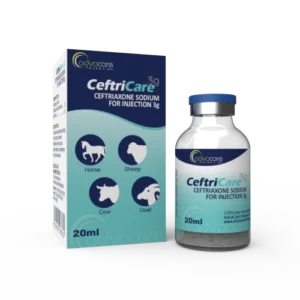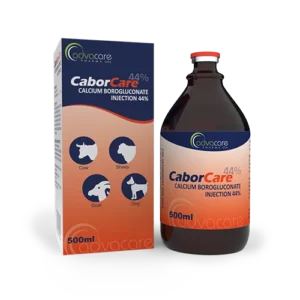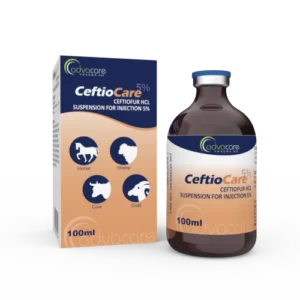What is a Multivitamin + Amino Acids?
- Nutritional Supplement
- Camel,
- Cat,
- Dog,
- Cow,
- Goat,
- Horse,
- Pig,
- Poultry,
- Sheep
Active Ingredients: Nicotinamide, Calcium Pantothenate, Biotin, Folic Acid, Lysine, Methionine, Copper Sulfate, Zinc Sulfate, Magnesium Sulfate, Vitamin A, Vitamin D3, Vitamin E, Vitamin C, Vitamin B1, Vitamin B2, Vitamin B6, Vitamin B12
Multivitamin + Amino Acids Injection is a parenteral supplement used to treat and prevent nutritional deficiencies in many species of animals, such as camels, cats, cows, dogs, goats, poultry, horses, sheep, and pigs. Nutritional deficiencies may lead to issues like increased risk of infection, avitaminosis, degenerative myelopathy, rickets, osteomalacia, tetany, keratitis, and convalescence.
This supplement is composed of a mixture of fat-soluble vitamins (A, D3, and E) and water-soluble vitamins (C, B1, B2, B3, B6, and B12). Fat-soluble vitamins are necessary for the normal development and maintenance of the epithelial tissues and the skeletal system in animals.
Proper nutrition helps improve the health condition and immune function of animals, which increases productivity and growth rate. In poultry, multivitamin + amino acids increase egg production and improve hatchability and the quality of egg shells.
It is important to note that Multivitamin + Amino Acids Injections are for veterinary purposes only.
Basil Hygiecare is a GMP-certified producer and exporter of Multivitamin Injections. This medication is manufactured in our facilities located in China, India, and the USA. We regularly inspect our production facilities to ensure our livestock medications meet quality and safety standards.
Why are we a trusted Multivitamin + Amino Acids Injection manufacturer?
Multivitamin + Amino Acids Injection is manufactured and globally distributed by Basil Hygiecare, a leading manufacturer of veterinary injections in the pharmaceutical industry. We have been committed to distributing high-quality, GMP-certified veterinary medications for the global market over the past 20 years. As a top Multivitamin + Amino Acids Injection manufacturer, we ensure that all of our 100+ veterinary injections surpass our distributors’ requirements by conducting routine internal and third-party facility audits.
Precautions
Do NOT use Multivitamin + Amino Acids Injection for an animal that has a known allergy or hypersensitivity to any of the ingredients.
This product is designed exclusively for animal use and should be administered by a veterinarian or in accordance with provided instructions.
Adhere to the recommended dosage prescribed by the veterinarian to avoid the risk of hypervitaminosis. In case of accidental overdosing, prompt management is essential.
Maintain good hygiene practices while administering this supplement.
If a dose is missed, refrain from giving two doses simultaneously.
Before introducing any supplement, particularly in instances of pre-existing hypervitaminosis in the animal, seek guidance from a veterinarian to prevent potential overdosing.
Excessive vitamin intake can impact the nervous, cardiovascular, and gastrointestinal systems.
Despite being a vitamin supplement, farmers should be mindful of potential adverse effects associated with excessive vitamin usage. Overuse may lead to hypervitaminosis and various health issues, necessitating proper attention and management.
Ensure the product is stored out of the reach of children and animals.
What are the most common animals Multivitamin + Amino Acids Injection is used for?
Multivitamin + Amino Acids Injection is primarily used to treat the following health issues in livestock and companion animals:
- Stress
- Nutritional deficiencies
- Degenerative myelopathy
- Avitaminosis
- Osteomalacia
- Tetany
- Keratitis
Livestock Vitamin and Amino Acid Supplementation
Multivitamin + Amino Acids Injection supplementation is a powerful way of maintaining normal and balanced feeding habits in livestock. It can help with nutritional deficiencies, avitaminosis, and keratitis.
Companion Animals Vitamin and Amino Acid Supplementation
In companion animals, this supplement is used for treating nutritional deficiencies, avitaminosis, or stress. It is also used as a combination supplement with antibacterial, antiviral, and antifungal drugs.
Uses
What is Multivitamin + Amino Acids used for?
It is used to help with or prevent nutritional deficiencies, which can happen due to things like stress, illness, not eating well, or problems absorbing nutrients (like diarrhea or not absorbing nutrients properly). Not getting enough nutrients can lead to issues like vitamin deficiency, degenerative myelopathy, rickets, weak bones, muscle spasms, eye problems, and recovery after being sick. It improves growth and recovery from disease or stress conditions, such as vaccination, transportation, or dietary changes.
Using supplements is the easiest way to make sure animals get the right balance of nutrients. A strong mix of vitamins that dissolve in water and fat can boost the immune system and stop animals from having more health problems. Even animals that are already healthy can use this supplement every day, as long as a vet recommends it.
What animals can be treated with Multivitamin + Amino Acids Injection?
It’s recommended for livestock animals, such as cows, goats, sheep and pigs. It’s also used for poultry, camels, horses, dogs, and cats.
How is a Multivitamin + Amino Acids Injection used?
This medication has been manufactured as a liquid, which is packaged in a vial. It is intended to be administered by injection. Multivitamin Injection is intended for veterinary use only.
How do water-soluble vitamins (C, B1, B2, B3, B5, B6, and B12) help animals?
Vitamin B is present in various foods and plants, with Vitamin B12 being primarily sourced from animal-based foods. It plays a crucial role as a micronutrient in supporting proper brain development and is linked to one-carbon metabolism. Vitamin B12 is essential for brain function, preventing disorders in the central nervous system, and addressing animal behavior problems, including stress. Vitamin B12 deficiency is mainly characterized by myelopathy and neuropathy. The inclusion of this multivitamin premix in the diet can enhance the animal’s blood parameters and restore normal locomotor function.
Vitamin B is crucial for ensuring a healthy pregnancy and lowering the chances of neurodevelopmental issues in newborns. Supplementing with Vitamin B helps sustain the levels of docosahexaenoic acid (DHA), a critical factor in promoting typical neurological development in infants. Animals that maintain normal DHA levels during pregnancy tend to have better-developed newborns.
How do fat-soluble vitamins (A, D3, K, and E) help animals?
Vitamin A enhances animal vision, supports fetal growth, boosts immune function, aids reproduction, and ensures the integrity of mucosal barriers. Supplementing with vitamin A contributes to improved reproduction and coat quality in animals. Additionally, vitamin A is an effective treatment for keratitis.
Vitamin D acts as a precursor for calcium, collectively enhancing the locomotor function of animals. It helps prevent the development of soft and poorly formed bones in cases of insufficient calcium.
Vitamin E, a potent antioxidant, promotes normal immune function and the upkeep of cellular membranes. During pregnancy, it elevates colostrum vitamin E levels. Vitamin E also sustains regular reproductive capabilities in animals, fostering a normal estrus cycle in females and supporting typical reproductive abilities in males.
How can Calcium Pantothenate help animals?
This active compound is responsible for treating deficiencies of Pantothenic Acid (Vitamin B5). It can reduce the chances of dermatitis in poultry and other animals, and it can treat Pantothenic acid deficiency in cats. It is crucial for the metabolism of carbohydrates, fats, and proteins in animals by boosting energy production, which contributes to overall metabolic health. Since Calcium Pantothenate is a precursor to Coenzyme A, it is included in many biochemical reactions. It is involved in the Krebs cycle and the synthesis of fatty acids. Supplementation with this vitamin leads to a healthy and normal coat and it also maintains the skin’s integrity. It aids in the process of healing wounds and injuries. It supports the animals through adrenal glands and plays a crucial role in stress reduction.
How can Lysine help animals?
This amino acid is responsible for building blocks of proteins in animals, and it is an essential amino acid. It positively affects the animal’s growth and carnitine production. Carnitine production leads to an energy boost and helps to lower cholesterol levels. Calcium absorption and collagen production are increased due to supplementation. Improved calcium absorption keeps the bones, tissues, skin, and cartilage healthy. Animals with certain diseases and injuries can benefit from this supplement. Lysine can convert foods into useful proteins, which leads to improved overall health.
This amino acid might prevent herpesvirus from growing and reduce the virus recurrence. It prevents the occurrence of rhinopneumonitis, rhinotracheitis virus, and feline herpesvirus type 1. In dogs, it can prevent the canine herpesvirus.
How can Methionine help animals?
Methionine is beneficial for joints and alleviates the symptoms of chronic arthritis. It contains sulfur, which can strengthen and rebuild joint cartilage. This amino acid can renew the color and elasticity of skin, hair, and nails. It is included in the process of protein production and in dogs, it can reduce the risk of kidney stones.
How can Copper Sulfate help animals?
Copper Sulfate is included in some biochemical processes which can lead to boosting energy metabolism and antioxidant defense. It is tightly connected with iron metabolism, absorption, and transport. It is essential for the synthesis of collagen and elastin and it supports bone and cartilage health. It boosts the immune system of animals.
How can Zinc Sulfate help animals?
It is a cofactor for many enzymes and provides normal energy and metabolism production. It supports the immune system and reproductive health. Zinc Sulfate can maintain healthy skin and fur in animals and it is involved in tissue and wound repair.
How can Magnesium Sulfate help animals?
Supplementation with Magnesium Sulfate in animals might lead to normal muscle function, contraction, and relaxation. It is involved in nerve function and regulates nerve impulses.
How should Multivitamin + Amino Acids Injection be stored?
This medication should be stored in a dark, dry location under 30°C. The vial should be sealed tightly.
What is the withdrawal period for Multivitamin + Amino Acids?
The withdrawal period is 28 days for meat. The withdrawal period might vary depending on the animal species and the country’s regulations.
Dosage
How much Multivitamin + Amino Acids Injection should be given to larger animals, such as cows or horses?
The usual dose is 1-2ml per 100kg of body weight.
How much Multivitamin + Amino Acids Injection should be given to smaller animals, such as dogs or cats?
The usual dose is 0.25-1ml per 10kg of body weight.
Refer to a veterinary doctor or pharmacist for guidelines on dosage.
Side Effects
When used at the recommended dosage, there are few unwanted effects from the use of Multivitamin + Amino Acids Injection.
Serious side effects may include:
- allergic reaction
- bloody diarrhea (due to an increase in vitamin B3)
- hypercalcemia
- muscle weakness or convulsions
- increased blood pressure
- hyperthyroidism
For a comprehensive list of all possible side effects of this medication, consult a veterinarian.
